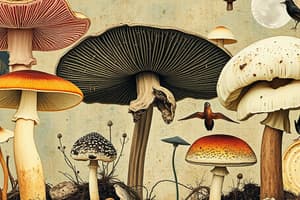Podcast
Questions and Answers
What is the defining characteristic of Fungi?
What is the defining characteristic of Fungi?
- Cell walls composed of chitin (correct)
- Cell walls composed of cellulose
- Contains chloroplasts
- Multicellular autotrophs
What organisms are included in the Plantae kingdom?
What organisms are included in the Plantae kingdom?
Mosses, cone-bearing plants, and flowering plants.
Eubacteria are known as the 'true bacteria'.
Eubacteria are known as the 'true bacteria'.
True (A)
What is the unique feature of the Protista kingdom?
What is the unique feature of the Protista kingdom?
Which kingdom includes cells that can survive in harsh and extreme conditions?
Which kingdom includes cells that can survive in harsh and extreme conditions?
What types of organisms are contained within Fungi?
What types of organisms are contained within Fungi?
Which prokaryotic organisms are included in the Eubacteria kingdom?
Which prokaryotic organisms are included in the Eubacteria kingdom?
What types of organisms are included in the Animalia kingdom?
What types of organisms are included in the Animalia kingdom?
Which kingdoms contain prokaryotic organisms?
Which kingdoms contain prokaryotic organisms?
What defines Animalia in terms of cellular structure?
What defines Animalia in terms of cellular structure?
What is notable about Archaebacteria?
What is notable about Archaebacteria?
All organisms in Fungi are heterotrophs and most are decomposers.
All organisms in Fungi are heterotrophs and most are decomposers.
Which kingdoms contain organisms with eukaryotic cells?
Which kingdoms contain organisms with eukaryotic cells?
What does the Protista kingdom include?
What does the Protista kingdom include?
What distinguishes Plantae in terms of cell structure?
What distinguishes Plantae in terms of cell structure?
Flashcards are hidden until you start studying
Study Notes
Fungi
- Characterized by cell walls made of chitin.
- Includes diverse organisms such as mushrooms, puffballs, molds, and mildews.
- All fungi are heterotrophs, and many play essential roles as decomposers.
Plantae
- Comprises various plant forms, including mosses, cone-bearing plants, and flowering plants.
- Features organisms with cell walls made of cellulose and chloroplasts for photosynthesis.
Eubacteria
- Known as "true bacteria," it encompasses various prokaryotic organisms.
- Includes notable types such as Streptococcus (strep) and Staphylococcus (staph).
Protista
- A diverse kingdom serving as a "catch-all" category for organisms with traits of both plants and animals.
- Contains unicellular and multicellular organisms, such as paramecium and amoeba.
Archaebacteria
- Comprises ancient and primitive prokaryotic organisms capable of thriving in extreme environments.
- Includes cells that can endure harsh conditions, distinguishing them from eubacteria.
Animalia
- Encompasses multicellular, heterotrophic organisms like worms, insects, and birds.
- Members lack cell walls and chloroplasts, exhibiting a variety of forms and functions.
Prokaryotic Organisms
- Both Archaebacteria and Eubacteria consist of prokaryotic cells, lacking a true nucleus.
Eukaryotic Organisms
- Animalia, Fungi, Plantae, and Protista consist of eukaryotic cells, characterized by a defined nucleus and organelles.
Studying That Suits You
Use AI to generate personalized quizzes and flashcards to suit your learning preferences.




